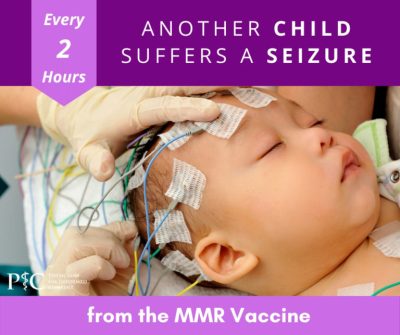Know Your Child’s Seizure Risk from the MMR Vaccine

All Global Research articles can be read in 51 languages by activating the “Translate Website” drop down menu on the top banner of our home page (Desktop version).
To receive Global Research’s Daily Newsletter (selected articles), click here.
Visit and follow us on Instagram at @globalresearch_crg.
***
Every year, about 5,700 U.S. children suffer seizures from the measles, mumps and rubella (MMR) vaccine.1 This finding is derived from results of the most statistically powered safety study ever to measure the association between MMR vaccination and febrile seizures. Published in JAMA in 2004, the study2 evaluated more than half a million children, both vaccinated and unvaccinated, from a Danish population that is relied upon globally to examine vaccine safety.
The results show that seizures from the MMR vaccine occur in about 1 in 640 children up to two weeks following MMR-vaccine administration. Applying this risk of seizures to the 3.64 million U.S. children vaccinated with a first dose of MMR every year3 results in about 5,700 annual MMR-vaccine seizures.
Febrile Seizures and Epilepsy
There is a five-fold higher risk of seizures from the MMR vaccine than seizures from measles infection,4 and a significant portion of MMR-vaccine seizures may cause permanent harm. For example, a Danish study of 1.54 million people, published in the American Journal of Epidemiology in 2007,5 examined the association between febrile seizures and epilepsy, a chronic brain disorder that leads to recurring seizures. The study found that 5% of febrile seizures may result in epilepsy. Consequently, about 300 MMR-vaccine seizures (5% of 5,700) may lead to epilepsy annually.1
The risk of seizure increases in siblings of children with a history of febrile seizures and in children with a personal history of febrile seizures, to 1 in 250 and 1 in 50, respectively.2
| Risk of Seizure Resulting from the First Dose of the Measles, Mumps and Rubella (MMR) Vaccine2 | |
| Children receiving first dose of MMR vaccine | Risk of seizure |
| Children overall | 1 in 640 |
| Siblings of children with a history of febrile seizures | 1 in 250 |
| Children with a personal history of febrile seizures | 1 in 50 |
In the U.S., measles is generally a benign, short-term viral infection; 99.99% of measles cases experience full recovery.6 Thus far, the MMR vaccine has not been proven to be safer than measles.4 It’s important for physicians and parents to objectively weigh the risks of measles vs. the risks and limitations of the MMR vaccine, so families can make informed, evidence-based vaccination decisions.
Summary of Key Facts and Figures

Seizures from the MMR vaccine occur 5 times more often than measles-related seizures.

Seizures can occur up to 2 weeks following the first dose of the MMR vaccine.

5,700 U.S. children experience MMR-vaccine seizures each year.

5% of febrile-seizure cases may develop epilepsy, a chronic brain disorder.

Of the U.S. children who experience MMR-vaccine seizures, 300 cases may result in epilepsy annually.

